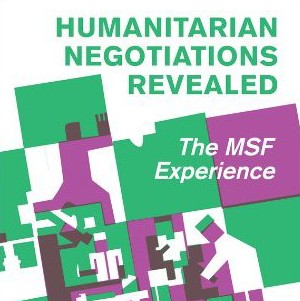 Book Review: Humanitarian Negotiations Revealed: The MSF Experience
Book Review: Humanitarian Negotiations Revealed: The MSF Experience
Authors: Clare Magnone, Michael Neuman and Fabrice Wiessman (editors)
Publisher: Columbia University – 287 pages
Book Review by: Nano Khilnani
The MSF in this book’s title refers stands for Medecins Sans Frontieres, which in
English, means Doctors Without Borders.
This book is a collection of the writings of 18 contributors based on their experiences in
working in areas of the world where humanitarian aid has been, and is needed. Almost
all of them are affiliated with MSF in some way or another. They are medical doctors,
nutritionists, program managers and other MSF staff members, researchers, and workers
in other capacities. Non MSF-affiliated people who wrote articles for this book are
journalists and academics.
The areas that providers of humanitarian aid go to, range from those where civil wars
prevail to where natural disasters have struck the inhabitants to where there are severe
life-threatening health problems.
Africa, the Middle East and parts of Asia dominate in the need for humanitarian help.
Afghanistan, Burma, Ethiopia, the Gaza Strip, India, Pakistan, Somalia, South Africa,
and Yemen are the places covered in this book, but so is France, an exception to the rule.
Contrary to popular belief, sending people to areas of the world where people need
help – food, medicines, medical care and supplies, water, shelter, security, protection
from killings by armed groups, and other threats – is not as easy as informing sovereign
governments or people that control certain geographic areas or ethnic groups that aid is
on the way.
It is far more difficult to provide humanitarian aid than most people assume. This book
reveals some of those difficulties encountered by the aid givers. Here are a few examples
of those hazards and obstacles:
Marie-Pierre Allie, president of the French section of MSF writes:
“Between 2004 and 2008, nine members of the Medecins Sans Frontieres were killed in
the course of their missions in Afghanistan, Central African Republic and Somalia. In
2008 and 2009, several MSF sections had to leave Niger and the north of Sudan because
the authorities had either suspended their activities or issued them with a deportation
order.”
In Sri Lanka, the MSF was forced remain silent in 2009 by the authorities or face
expulsion. The signed a memorandum of understanding to this effect, but they were
still not granted access to the combat zones to provide ad. In January 2010 this aid
organization was ordered to withdraw public statements the authorities in Yemen claimed
to be “inaccurate and insulting,” in order to continue providing humanitarian aid to those
who needed them.
Stories of bans, blockades, crackdowns, deaths, denials of access, deportations,
expulsions, false accusations, game-playing, prohibitions, repressions, retractions,
retreats, shut-downs, silencing, stalls, suppressions, suspensions, threats and other
frustrating situations that the MSF faced in trouble areas fill more than 150 pages of this
book.
What amazed me while reading this gripping book is the dedication and determination of
the teams of people who went to areas where essential needs such as food and freedom
were denied. All of this constitutes Part I of the book.
Part II traces a brief history of the humanitarian achievements over 40 years of Medecins
Sans Frontieres from the Cold War era to the almost complete collapse of communism
(with a few exceptions such as Cuba, Iran and North Korea) to the present war on terror.
In the Epilogue entitled In the Name of Emergency, Marc Le Pape discusses how the
MSF “adapts and justifies its choices” given all the difficulties it faces in different parts
of the world from repressive authorities.
In the Afterword, David Rieff discusses the single-minded objective of this relief
organization to help those who need it despite the numerous severe difficulties it faced.
He asserts that “there was never any room for compromise in the myth of the ‘French
doctors’ because “aid was a moral imperative, full stop. Like all doctrines founded on
such an absolute ….conception, moral ambiguity was taboo.”
This is a great fact-filled book that will broaden your horizons on the very admirable
work of people involved in the Medecins Sans Frontieres (Doctors Without Borders)
organization.






